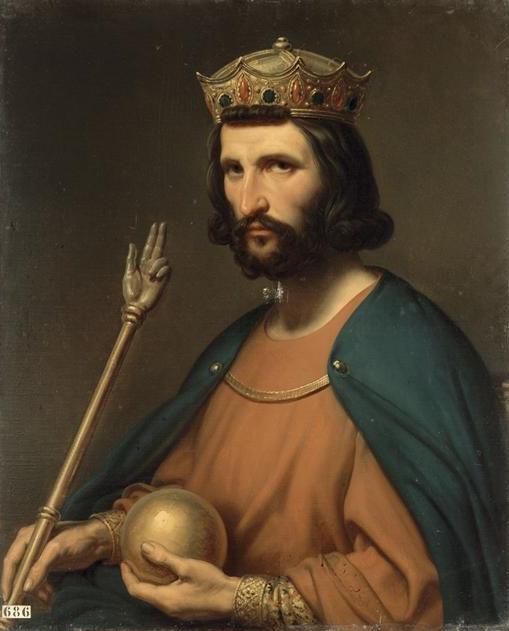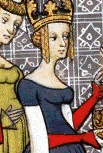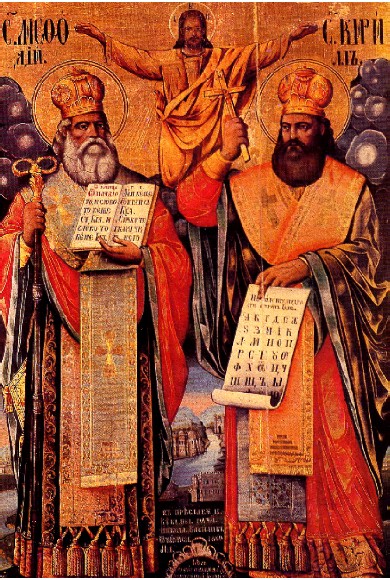|
Bivin Of Gorze
Bivin of Gorze (810/830–863) was a Frankish founder of the Bivinids family. He was married to a daughter of Boso the Elder, who may have been called Richildis. During his life he functioned as lay abbot of the Gorze Abbey.Pierre Riche, ''The Carolingians: The Family who Forged Europe'', transl. Michael Idomir Allen, (University of Pennsylvania Press, 1983), 198. His offspring includes: *Richilde of Provence, who married King Charles the Bald; *Richard the Justiciar Richard, Duke of Burgundy (858–921), also known as Richard of Autun or Richard the Justiciar, was Count of Autun from 880 and the first Margrave and Duke of Burgundy. He eventually attained suzerainty over all the counties of Burgundy save Mâ ..., Duke of Burgundy; * Boso, King of Provence; * possibly Bivin, Count of Metz. Notes Sources *Pierre Riché, The Carolingians, a family who forged Europe. {{DEFAULTSORT:Bivin of Gorze Bosonids 9th-century births 863 deaths Year of birth uncertain ... [...More Info...] [...Related Items...] OR: [Wikipedia] [Google] [Baidu] |
Franks
The Franks ( la, Franci or ) were a group of Germanic peoples whose name was first mentioned in 3rd-century Roman sources, and associated with tribes between the Lower Rhine and the Ems River, on the edge of the Roman Empire.H. Schutz: Tools, Weapons and Ornaments: Germanic Material Culture in Pre-Carolingian Central Europe, 400-750. BRILL, 2001, p.42. Later the term was associated with Romanized Germanic dynasties within the collapsing Western Roman Empire, who eventually commanded the whole region between the rivers Loire and Rhine. They imposed power over many other post-Roman kingdoms and Germanic peoples. Beginning with Charlemagne in 800, Frankish rulers were given recognition by the Catholic Church as successors to the old rulers of the Western Roman Empire. Although the Frankish name does not appear until the 3rd century, at least some of the original Frankish tribes had long been known to the Romans under their own names, both as allies providing soldiers, and as e ... [...More Info...] [...Related Items...] OR: [Wikipedia] [Google] [Baidu] |
Bosonids
The Bosonids were a dynasty of Carolingian era dukes, counts, bishops and knights descended from Boso the Elder. Eventually they married into the Carolingian dynasty and produced kings and an emperor of the Francia, Frankish Empire. The first great scion of the dynasty was Boso of Provence, Boso V, Count of Arles and of other Burgundians, Burgundian counties in the mid-9th century. Boso rose in favour as a courtier of Charles the Bald. He was even appointed viceroy in Regnum Italicum, Italy in 875. After the death of Charles' son Louis II of France, Louis II, Boso refused to recognise both Louis' sons, Carloman of France, Carloman and Louis III of France, Louis III as kings of France and proclaimed himself King of Provence in 879 at Vienne, Isère, Vienne, with the support of the nobility. Boso strove throughout the rest of his life to maintain his title in the face of the Emperor Charles III. He died in 887 and was succeeded by his son Louis the Blind, Louis under the regency of hi ... [...More Info...] [...Related Items...] OR: [Wikipedia] [Google] [Baidu] |
Boso The Elder
Boso (or Boson) "the Elder" ( 800 – 855) was a Frankish Count of Turin and Count of Valois of the Bosonid dynasty. Family and issue He was married to Engeltrude. They had the following issue: * Boso, Count of Valois (d. 874) * Teutberga (d. before November 25, 875), married Lothair II * Richildis (d. 883), married Bivin of Gorze * Hucbert, Count of Valois, lay abbot of St. Maurice's Abbey (820–864). Sources *Pierre Riché Pierre Riché (October 4, 1921 – May 6, 2019) was a French historian specializing in the early Middle Ages and the year 1000 (French: ''An mil'' or ''An mille''). Biography After studying at the Faculté des lettres de Paris, he passed the ..., ''The Carolingians, a family who forged Europe''. External linksGENEALOGY.EU: Bosonides [...More Info...] [...Related Items...] OR: [Wikipedia] [Google] [Baidu] |
Lay Abbot
Lay abbot ( la, abbatocomes, abbas laicus, abbas miles, ) is a name used to designate a layman on whom a king or someone in authority bestowed an abbey as a reward for services rendered; he had charge of the estate belonging to it, and was entitled to part of the income. The custom existed principally in the Frankish Empire from the eighth century until the ecclesiastical reforms of the eleventh. Background Numerous synods held in France in the sixth and seventh centuries passed decrees against this abuse of church property. The Merovingians had bestowed church lands on laymen, or at least allowed them their possession and use, though not ownership.Kirsch, Johann Peter. "Lay Abbot." The Catholic Encyclopedia Vol. 9. New York: Robert Appleton Company, 1910. 26 Jul. 2015 The Merovingian kings were ... [...More Info...] [...Related Items...] OR: [Wikipedia] [Google] [Baidu] |
Gorze Abbey
Gorze Abbey was a Benedictine monastery in Gorze in the present arrondissement of Metz, near Metz in Lorraine. It was prominent as the source of a monastic reform movement in the 930s. History Gorze Abbey was founded in around 757 by Bishop Chrodegang of Metz, who obtained for it from Rome the relics of Saint Gorgonius. The new community at first followed his Rule, but decline later set in. The highly placed Frankish lord Bivin of Gorze (810–863), married to a daughter of Boso the Elder, functioned as lay abbot of Gorze. In 933 the premises, by then semi-derelict, were given by Adalbero, Bishop of Metz, to John of Gorze and Einald of Toul so that they could restore observance of the Rule of St. Benedict. They did so extremely successfully and the customary of Gorze soon spread to many other monasteries, [...More Info...] [...Related Items...] OR: [Wikipedia] [Google] [Baidu] |
Richilde Of Provence
Richilde of Provence (c. 845 – 2 June 910, Kingdom of Lower Burgundy) was the second wife of the Frankish emperor Charles the Bald.Pierre Riche, ''The Carolingians: The Family who forged Europe'', transl. Michael Idomir Allen (University of Pennsylvania Press, 1983), 198. By her marriage, she became queen and later empress. She ruled as regent in 877. Life Richilde was the daughter of Bivin of Gorze, Count of the Ardennes, and the sister of Boso of Provence (of the Bosonid dynasty). Her aunt was Theutberga, the wife of Lothar II of Lotharingia. Her marriage to Charles the Bald, in 870 after the death of his first wife, Ermentrude of Orléans, was intended to secure his rule in Lotharingia through her powerful family and her connection to Theutberga, the previous queen. Richilde bore Charles five children, but only the eldest daughter, Rothilde, survived to adulthood. Whenever Charles went to war, Richilde managed the realm. She ruled as regent after the death of Charles in 877. ... [...More Info...] [...Related Items...] OR: [Wikipedia] [Google] [Baidu] |
Charles The Bald
Charles the Bald (french: Charles le Chauve; 13 June 823 – 6 October 877), also known as Charles II, was a 9th-century king of West Francia (843–877), king of Italy (875–877) and emperor of the Carolingian Empire (875–877). After a series of civil wars during the reign of his father, Louis the Pious, Charles succeeded, by the Treaty of Verdun (843), in acquiring the western third of the empire. He was a grandson of Charlemagne and the youngest son of Louis the Pious by his second wife, Judith. Struggle against his brothers He was born on 13 June 823 in Frankfurt, when his elder brothers were already adults and had been assigned their own ''regna'', or subkingdoms, by their father. The attempts made by Louis the Pious to assign Charles a subkingdom, first Alemannia and then the country between the Meuse and the Pyrenees (in 832, after the rising of Pepin I of Aquitaine) were unsuccessful. The numerous reconciliations with the rebellious Lothair and Pepin, as well as ... [...More Info...] [...Related Items...] OR: [Wikipedia] [Google] [Baidu] |
Richard, Duke Of Burgundy
Richard, Duke of Burgundy (858–921), also known as Richard of Autun or Richard the Justiciar, was Count of Autun from 880 and the first Margrave and Duke of Burgundy. He eventually attained suzerainty over all the counties of Burgundy save Mâcon and by 890 he was referred to as ''dux'' (duke) and by 900 as ''marchio'' (margrave). By 918 he was being called ''dux Burgundionem'' or ''dux Burgundiae'', which probably signified less the existence of a unified Burgundian dukedom than feudal suzerainty over a multiplicity of counties in a specific region. Life Richard was a Bosonid, the son of Bivin of Gorze and Richildis. His elder brother was Boso of Provence and his younger sister was Richildis, second wife of Charles the Bald. In 875, after the death of the Emperor Louis II, Richard and Boso accompanied Charles to Italy for his imperial coronation. In February 876, in Pavia, while preparing for his return journey, Charles nominated Boso "Duke and Viceroy of Italy and Duke o ... [...More Info...] [...Related Items...] OR: [Wikipedia] [Google] [Baidu] |
Boso Of Provence
Boso (french: Boson; c. 841 – 11 January 887) was a Franks, Frankish nobleman of the Bosonids, Bosonid family who was related to the Carolingians, Carolingian dynasty and who rose to become King of Burgundy, King of Lower Burgundy and King of Provence, Provence. Origin Boso was the son of Bivin of Gorze, count of Lotharingia, by Richildis, the daughter of Boso the Elder by his wife Engeltrude. His maternal aunt Teutberga was the wife of King Lothair II of Lotharingia. Boso was also the nephew of Count Boso of Valois, for whom he was named, and of Hucbert, lay abbot of St. Maurice's Abbey, to which Boso succeeded in 869. Countship In 870, King Charles the Bald of West Francia married Boso's sister Richilde of Provence, Richilde. This marriage paved the way for Boso's career in the service of his royal brother-in-law. In the same year, Boso was appointed count of Lyon and Vienne, Isère, Vienne, replacing Gerard of Roussillon. In 872, Charles appointed him chamberlain (office) ... [...More Info...] [...Related Items...] OR: [Wikipedia] [Google] [Baidu] |
9th-century Births
The 9th century was a period from 801 ( DCCCI) through 900 ( CM) in accordance with the Julian calendar. The Carolingian Renaissance and the Viking raids occurred within this period. In the Middle East, the House of Wisdom was founded in Abbasid Baghdad, attracting many scholars to the city. The field of algebra was founded by the Muslim polymath al-Khwarizmi. The most famous Islamic Scholar Ahmad ibn Hanbal was tortured and imprisoned by Abbasid official Ahmad ibn Abi Du'ad during the reign of Abbasid caliph al-Mu'tasim and caliph al-Wathiq. In Southeast Asia, the height of the Mataram Kingdom happened in this century, while Burma would see the establishment of the major kingdom of Pagan. Tang China started the century with the effective rule under Emperor Xianzong and ended the century with the Huang Chao rebellions. While the Maya experienced widespread political collapse in the central Maya region, resulting in internecine warfare, the abandonment of cities, and a northward ... [...More Info...] [...Related Items...] OR: [Wikipedia] [Google] [Baidu] |
863 Deaths
__NOTOC__ Year 863 ( DCCCLXIII) was a common year starting on Friday (link will display the full calendar) of the Julian calendar. Events By place Byzantine Empire * September 3 – Battle of Lalakaon: A Byzantine army confronts an invasion by Muslim forces, led by Umar al-Aqta, Emir of Malatya. The Muslims raid deep into Byzantine territory, reaching the Black Sea coast at the port city of Amisos. Petronas annihilates the Arabs near the River Lalakaon, in Paphlagonia (modern Turkey). Europe * January 25 – Emperor Louis II claims Provence, after the death of his brother Charles. King Lothair II receives Lower Burgundy and a part of the Jura Mountains. * King Louis the German suppresses the revolt of his son Carloman (for the second time), who wants a partition (mainly of Bavaria) of the East Frankish Kingdom. * Viking raiders again plunder Dorestad (modern Netherlands), a Frankish port on the mouth of the river Rhine. It thereafter disappears from the c ... [...More Info...] [...Related Items...] OR: [Wikipedia] [Google] [Baidu] |





